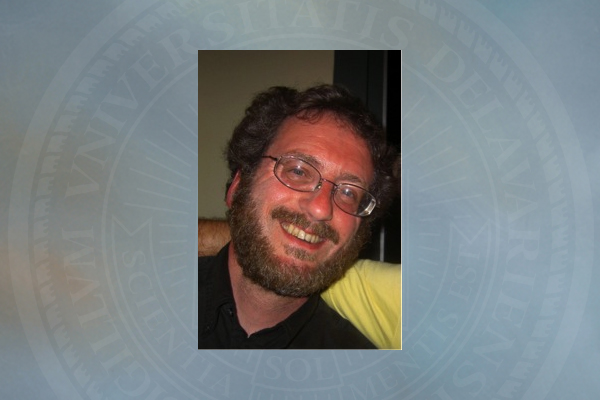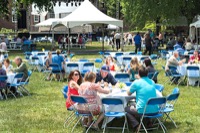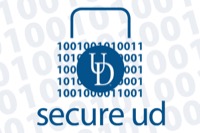
In Memoriam
Colleagues, friends remember Prof. Norbert Mulders, professor of physics and astronomy
3:24 p.m., April 23, 2015--University of Delaware colleagues, friends and students of the late Dr. Norbert Mulders, professor of physics and astronomy, remember him as a dedicated and inspiring teacher, a brilliant experimental physicist and an open and witty companion.
Dr. Mulders, a UD alumnus and member of the faculty since 1996, died from complications resulting from esophageal cancer on Monday, March 30. He was 55.
FYI Stories
June 6: UDid It! Picnic
2FA protects you
"On behalf of the entire campus community, I extend our deepest condolences to Dr. Mulders' family, colleagues and students," said UD Provost Domenico Grasso. "We have lost a well-respected scholar, a dedicated mentor to hundreds of students and a valued colleague."
“We will remember Norbert as a thoughtful and influential member of our campus community; a generous, dedicated educator and student adviser, and a brilliant experimental physicist within our department; and a highly respected member of the low temperature physics community," said Ed Nowak, chairperson of the Department of Physics and Astronomy. "Norbert was engaged holistically in department affairs: its teaching and scholarship missions, its people, the physical space and its supporting facilities. We will sorely miss his leadership of the academic programs and his stewardship over the department in general.”
Nowak added, “Norbert commanded respect through his irrepressible honesty and willingness to speak his mind. Not only did this bring clarity to decision making, but it was often a source of delight and laughter at faculty meetings, lunches and gatherings.”
Over the course of 12 years, Dr. Mulders served as director and guiding force of the department's graduate and then undergraduate programs. He was very interested in different cultures and also had a keen interest in exposing students to science, engineering and culture outside of the United States. The South American study abroad program that he developed and ran was widely popular and often cited by graduating physics and physics education majors as a memorable part of their college experience.
In the laboratory, Dr. Mulders was a technical and engineering wizard. He will be remembered even more for being incredibly generous at sharing his expertise and providing advice and help to students and faculty on how they should design and conduct their experiments. “His ability and enthusiasm for such things was inspirational. I will never forget that spring in his step and the characteristic pushing up of his shirt sleeves when he set about to get something done in the machine shop, the advanced teaching lab or his research lab,” Nowak said.
Born in the Netherlands, Norbert completed the equivalent of a bachelor of science degree in physics at the University of Eindhoven in 1984. He then moved to the United States in 1985 on a Fulbright fellowship to start his doctoral degree in physics, which he completed in 1989 at the University of Delaware. After postdoctoral and research associate positions at the University of California-Santa Barbara, University of Exeter and Penn State University, he joined the UD faculty in 1996.
Dr. Mulders had broad research interests at the core of which was understanding phenomena in quantum fluids and solids at temperatures near absolute zero. A gifted low-temperature, experimental physicist, his technical ability coupled with his keen sense of identifying important scientific questions guided his use of quantum fluids for the study of general problems such as continuous phase transitions, physical adsorption and even problems in cosmology.
Dr. Mulders perfected the technique of making silica aerogel, a fibrous solid that is only four times heavier than air, to study the properties of quantum fluids in disordered media. His experiments revealed spectacular new phenomena that raised tremendous interest in the low temperature physics community. Moses Chan, Evan Pugh Professor of Physics at Penn State, said, “It is not an exaggeration to say that Norbert started a new field in helium physics and launched the scientific careers of many colleagues worldwide”.
Dr. Mulders published more than 150 papers, and he held one patent.
He is survived by his mother, Maria M.R. Mulders-Staeb; sisters, Monica Mulders, Irene van Wulfften Palthe and husband, Han, Ingrid Mulders and husband, Tony Schoen; and nieces and nephews, Nomi Mulders, Else and Rutger Palthe, and Tijmen, Oscar and Jonathan Schoen.
A memorial service celebrating his life was held April 3 in Eindhoven, Netherlands.
A student award in memory of Dr. Norbert Mulders and a local symposium in celebration of his life and career are also being considered. Details will be posted on the Department of Physics and Astronomy webpage when they become available. Friends and colleagues who wish to support the student award and/or symposium are asked to please send contributions to: University of Delaware, Gifts Processing, 83 East Main St., 3 Fl., Newark, DE 19716. Make checks payable to "University of Delaware" and include on the memo line “in memory of Dr. Norbert Mulders”. Gifts can also be made on the University of Delaware’s secure website, www.udel.edu/makeagift.
Remembering Dr. Mulders
Irene van Wulfften Palthe-Mulders, sister, on behalf of the Mulders family:
"Norbert was ‘a barrel full of contradictions.' A very private person on the one hand, he seldom spoke about feelings or emotions; an einzelgänger -- dedicated to his research and the University. But on the other hand, he was an easy socializer with a big mouth. We spent many nights over a good glass of wine, enjoying lavish dinners, having conversations about just about everything. He was intelligent and interested in anything and everything.
"From his students, we have received numerous emails about how sincerely committed he was to help them. And even toward the end, when he was really sick, he still thought about leaving gifts for his family and friends. His colleagues called him shy, in a way, but lovable and kind.
"In Holland, where he spent the last three months of his life, he was the easiest patient that one could wish for. He was satisfied with everything we did for him. Norbert was at last determined to die, he was convinced he was finished with this life. But only because he was so sick. He would have liked to grow really old. He loved his life and got out of it whatever was in it!”
Karl M. Unruh, professor of physics and astronomy and colleague of 30 years:
“It didn't take long to realize that Norbert had a unique set of views -- usually insightful, occasionally irritating, but always interesting -- on almost everything. In thinking back over all my interactions with Norbert, several specific things stand out: Norbert thought for himself, he was not impressed by authority and common wisdom, and he was direct, honest and straightforward in his interactions with others. Norbert taught me a lot, and I will miss him.”
John Beamish, Ph.D. adviser to Dr. Mulders and now physics professor at the University of Alberta:
“Norbert’s friends and colleagues know how interested he was in different cultures and won’t be surprised that he had his own approach to them. Some of my favorite times were spent eating, hiking and visiting museums with Norbert. Sometimes his approach led to unexpected experiences, like an entire meal of relishes in a restaurant in Japan, or very personal conversations with Penn State football players in a State College bar, but they were always memorable.”
Ed Nowak, professor of physics and astronomy:
“One of my fondest memories of Norbert, and a side of him not usually seen, is from one of our department’s annual picnics. My children lured Norbert behind some trees, proceeded to ambush him, took his hat from him and spent some time playing that time-honored game of ‘keep-away’ with Norbert’s hat. Norbert was a good sport and played along. I think he rather enjoyed the attention.”
Moses Chan, physics professor at Penn State University:
“Norbert spent three years at Penn State as a research associate, although I was technically his adviser, I learned far more from him that the other way around. His child-like curiosity and work ethics in the lab was contagious for all my students and myself. In contrast to many of us, he was not at all concerned about credits, he just wanted to see his experiments to work and quickly.”
Heather Briggs, Class of 2009:
“I wish to express my deepest gratitude to Dr. Mulders for making us into better physicists. Some of my best memories at UD were all of Norberto’s quotes from class and my study-abroad experience in Argentina!”
Jason Huynh, Class of 2013:
“As my former adviser, I trusted you. You gave me the guidance I needed to figure out the right courses to take in college. As my former instructor, I respected you. Although you were tough, I learned from that and I admire that. You are part of the reason why I am where I am today studying medical physics, and now you are part of my motivation to continue studying medical physics. You were a great man, and you will always be remembered.”
David Daughton, who earned his bachelor's and master's degrees at UD in 2001 and 2004:
“Five years under his tutelage had an extraordinary impact on my life – shaping career, work ethic and worldview. The Norbert I got to know was generous, passionate, diligent and witty. Most nights or weekends, I could expect to find him pecking away at something in Sharp Lab. The accompanying commentary on South Park, Harry Potter or any number of other cultural topics was both unexpected and hilarious.”








